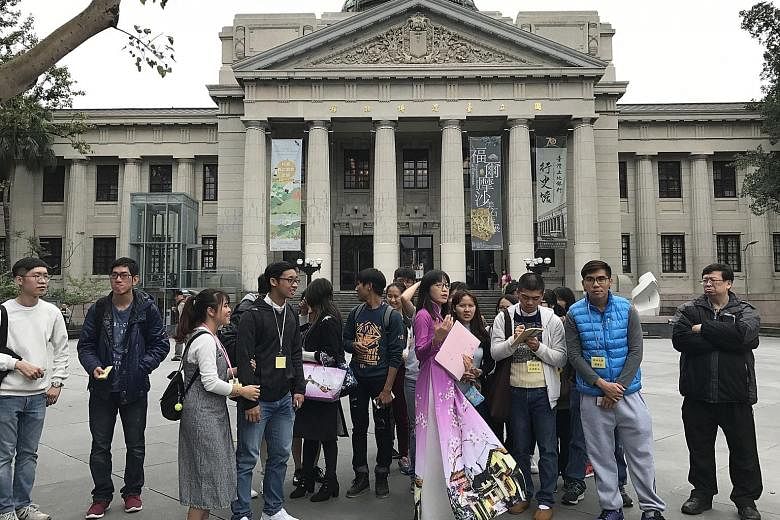Since moving to Taiwan in 2014, Ms Jessie Nguyen Thi Ngoc Mai has become something of a Jane of all trades.
The 31-year-old, who speaks fluent Mandarin, helps translate documents at Taiwan's immigration bureau, teaches Vietnamese in a university, and conducts Vietnamese tours at the National Taiwan Museum at least once a month.
Ms Mai, who sank her roots in Taiwan after marrying her property agent husband, also helps to look after Vietnamese kids at a primary school.
"People are surprised when they hear that I am a Vietnamese who has been here for only three years but it is a good thing because this means that I am adapting well and making a difference," said Ms Mai, who is also studying for a master's degree in applied Chinese language and culture.
While foreign women from China and South-east Asia who marry a Taiwanese have tended to be looked down upon as "mail order brides" previously, things are now looking up for them.
Like Ms Mai, more of these foreign spouses - almost all are women - are making their presence felt as school teachers, translators in government agencies, and tour guides in the tourism industry.
The Education Ministry has since 2012 hired about 700 of them as mother-tongue teachers, while the National Taiwan Museum has roped in about 20 foreign spouses as weekend guides since 2015.
This comes as Taiwan taps these foreign spouses as cultural middlemen of sorts, to boost its efforts to do more business with Asean under the New South Bound policy. The ranks of new immigrants from South-east Asia have grown from 130,000 in 2010 to some 170,000 today.
Taiwan President Tsai Ing-wen said last year that immigrants have become a major pillar of the island's economy, and that she hoped they can "inject fresh momentum into Taiwan's development".
Ms Tsai's ruling Democratic Progressive Party (DPP) government has beefed up efforts to improve the welfare of these new immigrants. In February, it launched a committee to address their needs and help them better assimilate into Taiwanese society.
Among other things, there are schemes to allow students, especially second-generation immigrant children, to choose a South-east Asian language as their mother tongue in school from next year. There are also plans to sponsor second-generation immigrants to visit their grandparents in South-east Asia.
The agency has also eased the restrictions for foreign spouses to become Taiwan citizens. They no longer have to prove they have the professional skills or financial viability to be considered for citizenship, a requirement which many foreign spouses could not meet as they did not have a permanent job.
The immigration agency is working with tour agencies to certify new immigrants and foreign spouses as tour guides to lead tour groups from Asean.
"Language should never be a barrier for people who are interested to know about art and Taiwan's history and culture. By getting immigrants to be guides, they not only get to know Taiwan better but also build their own networks and communities here," National Taiwan Museum's education department researcher Emily Hsu told The Straits Times.
But the battle against discrimination towards foreign spouses and new immigrants is far from over, say some activists.
Ms Liang Tsuying, executive secretary of TransAsia Sisters Association Taiwan, told ST many women still find it hard to get work, with many taking on jobs as cleaners or stall assistants. "They may have university degrees from their countries but they still draw lower salaries than the locals because some employers think they are not as good."
But lawmakers like the opposition Kuomintang's Lin Li-chan, who last year became the first new immigrant to be voted in as a lawmaker, hopes to do more to change people's perceptions of foreign spouses.
Ms Lin, a Cambodian who came to Taiwan in 1997 and is now a citizen, told ST: "We need more understanding and respect in society to get rid of all the misconceptions. After all, we already call Taiwan home."

